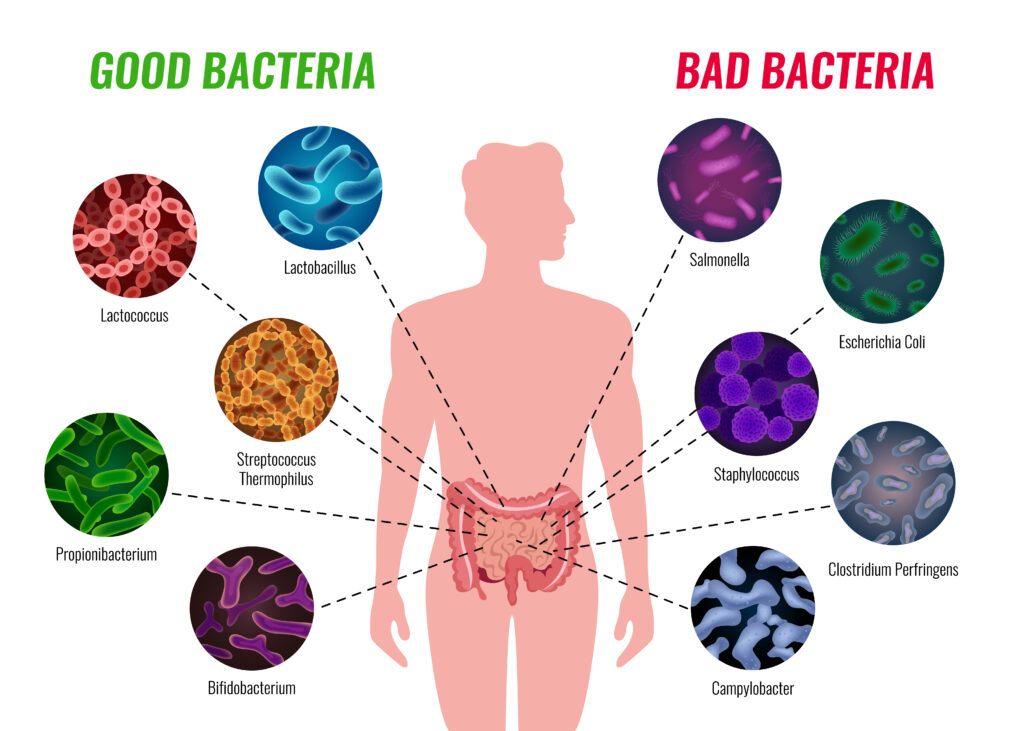
What Are Probiotics?
Probiotics are a mixture of live bacteria and/or yeast that help support digestion and our gut health. Since our digestive system is made of millions of bacteria, eating or taking probiotics can help support our gut health by adding more healthy bacteria into our gut.
Probiotics can come in the form of a supplement or it can be found naturally in certain foods.
Common Sources of Probiotics
- Raw Organic Grass-Fed Yogurt
- Raw Organic Kefir
- Organic Sauerkraut
- Kombucha
- Some Cheeses
- Organic Chocolate (90% or higher)
- Kimchi
Side note: Prebiotics are ANY of the foods that FEED the microbes in our gut. For more information on Prebiotics, check out our article here.
Are Probiotics Good For Me?
Generally – YES. Having healthy bacteria and microbes in our digestive system is very important for a healthy gut and probiotics can aid in this. Having healthy and adequate levels of the right gut microbes improves overall digestion, our mood, hormone imbalances, inflammation, and nutrient absorption. For more on gut health – check out our whole collection of articles here.
Just like with most things that can be good, however, too much of even a good thing can become harmful (more on that next). It’s all about balance…
Should I Be Taking A Probiotic?
Great question! The answer is not so straight-forward though. Gut health and microbiome health is all about balance. We need the right balance between different stands of bacteria (i.e. the “good” vs the “bad”).
Since everyone’s gut is different, everyone needs different things. Some people would be better off with a probiotic, some would be worse off.
But how can you know for-sure if a probiotic would be good for you or not? Well, it is much easier for us to know when a probiotic is NOT a good idea. For example, if you have a bacterial overgrowth (SIBO) or a fungal overgrowth (SIFO), you shouldn’t be taking a probiotic. If you experience bloating, poor digestion, diarrhea and/or constipation, you may actually suffer from SIBO or SIFO — if that’s you, you should avoid probiotics.
If you don’t have any of those symptoms, a probiotic can be helpful but I will generally always recommend getting nutrients through whole foods first. Try a health raw organic yogurt, kombucha, or any of the other probiotic sources mentioned previously. If you need more probiotics, your symptoms will improve by eating these foods. If not, you may notice worsening of symptoms.
Probiotic Supplements – A Fad?
Probiotics and Prebiotics have become so highly recommended over the past 10-20 years, that they’ve actually become a fad. Now you see probiotics and prebiotics being put into protein shakes, protein bars, and other “healthy” snack bars.
At first glance, it’s a great idea because of the powerful benefits of probiotics. However, not everyone needs those specific probiotics and they could actually be bad for you.
Are All Probiotic Supplements The Same?
Just like every protein shake or supplement is a little different, probiotic supplements also vary greatly. In most people, some probiotic supplements can cause problems and some probiotic supplements can improve things. Every probiotic supplement has different levels of different strands of bacteria. It’s very important to check with your functional doctor as to whether or not you need one and if you do, which one you need.
We always check this using Systems Health Care to understand what is going on with your gut health, if a probiotic would be harmful for you, or which probiotic would be best if you do need one.
Optimize Your Gut Health
As mentioned previously, we have a whole overview on gut health, the main things damaging our gut health, and how to address them. You can find that specific article here.
For OPTIMAL gut health, you need to focus on what you eat, getting consistent movement everyday, having a great mood/attitude, and being outdoors as much as possible. If you are lacking in any of these areas with your current lifestyle, consider making the right lifestyle changes to allow your gut to be as healthy as possible!
For difficult, chronic, or complex digestive problems, we may have to look DEEPER at underlying layers such as infections (parasites, bacteria, fungus, viruses), toxicities (aldehydes, ammonia, heavy metals), and inflammation. These things can be rather difficult to address — even for many health care professionals. Find a functional and holistic doctor who has had great success in addressing these things. I wish you the best of luck and if you have any questions, feel free to reach out — my passion is to help people.
Suffering From Digestive / Gut Problems?
At Freedom Health and Wellness, we address all of these things and more through a personalized and functional approach. We help people with chronic diseases and illnesses regain their health by getting to the source of their health concerns.
Have questions?
Dr. Miller offers a free zero-risk 15-minute consult to connect, address any questions or concerns you have, or discuss what care may look like! Just click the button below to schedule your free consult and Dr. Miller will look forward to talking with you!
Ready to partner together?
If you are looking for a doctor who is genuine, compassionate, and most importantly, able to help you, click below to schedule your first appointment. We are excited to see life-changing results with you!